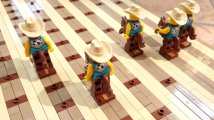CrazyEddie
Full House
There's two ways to answer that question.But I'm curious what the math "should" be for a theoretically "correct" distribution of holes per horse (which would only really matter if the card component of the game wasn't present).
If you mean: "out of all the horses that run a given race, what distribution of holes ensures that each horse has an equal chance to win after removing the scratched horses", then the correct distribution is [1,2,3,4,5,6,5,4,3,2,1] or some exact multiple of that such as [3,6,9,12,15,18,15,12,9,6,3] - counting the number of moves needed to cross the finish line, which includes the holes in the middle and the holes at the finish line but not the holes at the starting line.
If you mean: "across multiple races, what distribution of holes ensures that each horse wins the same number of races, taking into account that being scratched means the horse can't win that race" then there is no distribution of holes that can ensure the probabilities are exactly the same. However, @Darson 's posts here and here provide a distribution which comes pretty close to having each horse win an equal number of times. Specifically:
If you're building your own board, I would recommend the following hole pattern as an easy to remember distribution:
Horse Win (number of jumps to win) Win % Number of peg holes between start and finish 2 4 8% 3 3 6 10% 5 4 8 10% 7 5 10 9% 9 6 12 8% 11 7 14 8% 13 8 12 8% 11 9 10 10% 9 10 8 10% 7 11 6 10% 5 12 4 8% 3
The reason that there's two different answers to your question is because of the scratches. The [1,2,3,4,5,6,5,4,3,2,1] distribution provides a perfectly equal chance for each horse to win if there were no scratches (and thus provides a perfectly equal chance to win between all the horses that don't scratch). But because there are scratches, that changes things - and the inner horses are much, much more likely to scratch than the outer horses, which is why most people feel that the 2 and 12 win a lot more often. They do win a lot more often, because they so rarely scratch.
Last edited:


